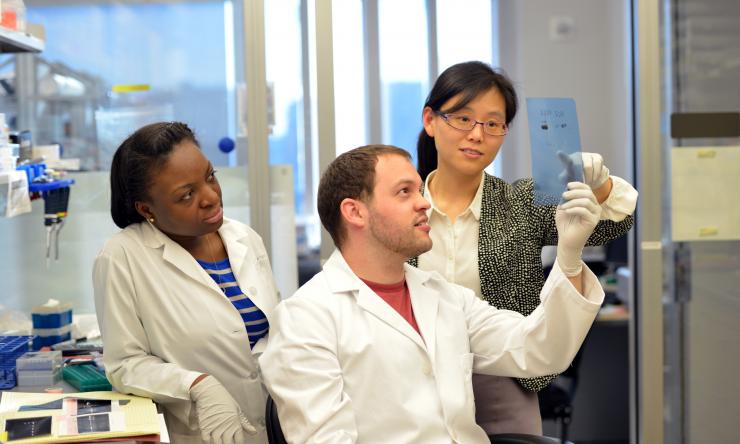Responsible Conduct of Research is defined as "the practice of scientific investigation with integrity." It involves the awareness and application of established professional norms and ethical principles in the performance of all activities related to scientific research.
As part of the America COMPETES Act of 2007, all trainees, fellows, participants, and scholars receiving support through any NIH or NSF training, career development , research education, or fellowship grants must receive instruction in responsible conduct of research at least once every four years during each career stage (undergraduate student, graduate student, postdoctoral associate).
At Baylor College of Medicine, all research participants are encouraged to participate in RCR training. Graduate students receive RCR training as part of the curriculum within the M.S. and Ph.D. programs offered at BCM. For postdocs, there are annual training sessions held each spring in the months of March, April, and May. This training takes place via four training modules, each including lecture topics and small-group case study discussions. If all four training modules are not completed in the same year, the remainder can be completed the following year. Modules are independent and can be viewed in any order.
| Module 1 | Module 2 | Module 3 | Module 4 |
|---|---|---|---|
| Data Acquisition & Record Keeping | Research Misconduct & Safe Practices in the Lab | Authorship, Peer Review, & Conflicts of Interest | Ethics in Research with Human Subjects |
| Responsible Authorship | Ethics in Biomedical Studies involving Animals | Collaboration in Research and with Industry | The Scientist as Responsible Member of Society |
| Mentorship & The Mentor-Mentee Relationship | Rigor & Reproducibility – Topics A | Rigor & Reproducibility – Topics B |
Each year on the third Monday in February, the Office of Postdoctoral Affairs will announce the registration period for Postdoc RCR training. This announcement will be made via the BCM Postdoc Listserv. Registration is handled via the PAPS system by the announced deadlines.
Spring 2025 Training Information
Responsible Conduct of Research (RCR) Training for postdocs will be held in 2025 on Thursday afternoons during the month of April (April 3, 10, 17 and 24). Sessions will run from 1 p.m. until 5 p.m. The location will be room N315 in the Alkek Building on the BCM main campus.
Training Description
RCR Training for the research postdoc community is offered once per year in the month of April. The training consists of four modules, which each include lectures, discussions, and small group activities. The modules are numbered 1-4 (for recording-keeping purposes) but can be attended in any order. The expectation is that all four modules should ideally be taken in the same year; however, a trainee can make up an absence in the following year to complete the training. All four modules must be completed during two back-to-back years for the training to be considered complete. While in postdoc status, an individual in an NIH-funded laboratory should attend RCR training at least once every four years. RCR training on a recurring basis is encouraged for all BCM postdocs regardless of lab funding source.
Training Dates for 2025
- Thursday, April 3, 2025 - 1-5 p.m. - Room N315, Main Campus
- Thursday, April 10, 2025 - 1-5 p.m. - Room N315, Main Campus
- Thursday, April 17, 2025 - 1-5 p.m. - Room N315, Main Campus
- Thursday, April 24, 2025 - 1-5 p.m. - Room N315, Main Campus
Registration Process
Registration for the 2025 training session is open from February 17 to March 28, 2025. The deadline to register is March 28, 2025. Advanced registration is required to take the training. Individuals who attend any training sessions without registering in advance will not have that training counted.
- Research postdocs register through the PAPS system. To register, a postdoc's profile must be current and their appointment up-to-date. Contact the Office of Postdoctoral Affairs with questions regarding PAPS access and procedures.
- Clinical faculty/fellows/postdocs and other research staff, see below.
Upon successful completion of the training, the GSBS Curriculum Office provides an attestation of completion (PDF format). Postdoc RCR training is not considered graduate-level coursework for credit and does not appear on an official transcript.
RCR Training for Clinical Postdocs/Fellows
Clinical postdocs and fellows can learn about registering for the Responsible Conduct of Research for Clinical Investigators (RCRCI) course offered by the Graduate School's Clinical Scientist Training Program in August every year. The registration (Baylor login required) period for that course is in early July. RCRCI meets for four consecutive days Monday through Thursday, from 5:30 - 7:30 p.m. (Aug. 18-21 in 2025). Preregistration is required; this course is considered graduate-level coursework and successful completion is logged on an official transcript.
RCR Training for Other Members of the Research Community
For information on RCR training for faculty, primary investigators, research staff, and administrative contacts, including CITI training, please email the Office of Research Compliance (oor-compliance@bcm.edu).
Graduate School of Biomedical Sciences
The GSBS provides the resources, opportunities, research environment, support, mentorship, and education you need to reach your full potential as a scientist, a professional, and an individual. Explore the school’s website to learn more.
Academic Policies
View the Graduate School of Biomedical Sciences policies and procedures manual as well as College-wide policies relevant to postdoctoral fellows and faculty mentors.









